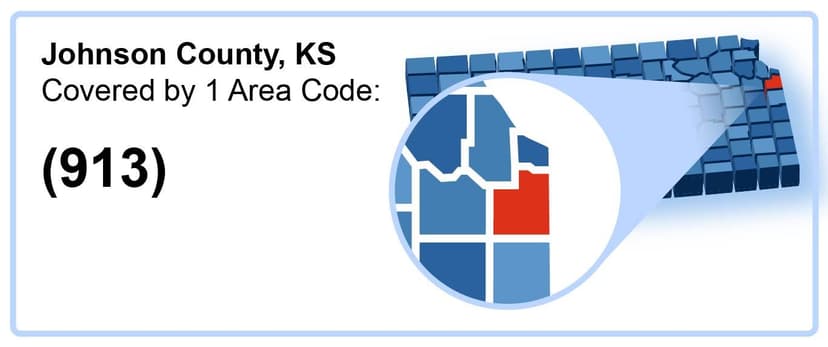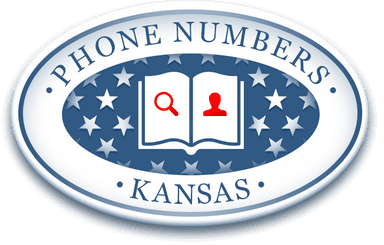What are Johnson County Area Codes?

The string of three-digit numeric code that starts a North American telephone number is known as an area code. Area codes identify the different numbering plan areas (NPAs) established by the North American Numbering Plan (NANP). NPAs specify the locations where telephone numbers under the NANP are registered. The Kansas Corporation Commission administers area codes in Johnson County.
Currently, only one area code covers Johnson County. This area code also covers other counties in the Kansas City Metropolitan Area.
Area Code 913
Area code 913 is the telephone area code in the NANP for northeastern Kansas. This NPA covers most of the Kansas City metro area in the State of Kansas. It previously covered all of northern Kansas but was reduced to its current size in 1997. Cities in Johnson County under this NPA include De Soto, Gardner, Leawood, Lenexa, Mission, Olathe, Overland Park, Prairie Village, Shawnee, and Spring Hill.
What are the Best Cell Phone Plans in Johnson County?
According to the report of a 2018 survey undertaken by the CDC, 77.2% of children (under 18) in Kansas households used wireless-only telephone services. Children who used only landline phones made up less than 1% of the demographic. The disparity was slightly better among adults (over 18). About 64.6% of this demographic exclusively used cell phones, while 3.4% only used landlines. The report indicated that wireless telephony services had become the preferred choice among Johnson County residents.
The four major phone carriers (AT&T, Verizon, T-Mobile, and Sprint) claim 100% coverage in the Kansas metro area. While phone service may get tricky in remote rural areas, it is great overall in the county. Besides these major carriers, MVNOs also provide phone services in the county. MVNOs, or Mobile Virtual Network Operators, are smaller mobile phone companies that offer attractive telephone service bundles at lower rates while operating on the networks of the big carriers.
Several VoIP providers offer phone services to Johnson County residents for business and personal users. VoIP services utilize IP networks, typically broadband internet connections, to deliver telephony services that are more efficient, flexible, and cheaper than traditional telephone services.
What are Johnson County Phone Scams?
These are fraudulent schemes carried out over phone and used to steal money and confidential information from county residents. Phone scammers employ regular calls, robocalls, and text messages to target and defraud their victims. Residents can use phone number searches to look up information on suspicious phone numbers used to commit these acts.
The following agencies provide Johnson County residents with information and resources to assist them in dealing with phone scammers.
- Johnson County District Attorney’s Office
- Local law enforcement agencies
- Kansas Attorney General’s Office
- Federal Trade Commission
- National Consumers League
Victims can also file reports with these agencies. Some common phone scams in Johnson County are:
What are Credit Card Scams?
These scams usually begin with the targets receiving robocalls offering lower credit card interest rates. The robocalls deliver prompts that connect targets to scammers pretending to be employees of credit card companies. The scammers claim the victims qualify for programs to help lower interest rates and pay off credit card debts sooner. They ask the victims to pay nominal fees to enroll in the programs and provide their credit card information. The scammers often sound legitimate and, in some cases, may have some information about the targets’ credits cards. However, residents who fall for this scam end up losing money and granting the scammers access to their credit card accounts, which they use to run up bills.
Do not give out confidential information to unknown persons over unsolicited phone calls. Credit card companies do not randomly contact their customers and request card details, as they already have these records. If you receive such calls, especially if they are robocalls, hang up immediately. Reverse phone number lookup services can verify if such phone calls are legitimately from credit card companies.
What are Computer Repair Scams?
In these scams, callers contact residents and claim to be technical support representatives of reputable computer firms. The callers tell their targets that they have detected viruses on their computers and ask for remote access to run complete diagnostic checks and assess the problems properly. If granted access, the scammers install malicious malware on the computers to steal confidential files and personal information.
Alternatively, they might send out spam emails from the targets’ accounts. These scammers can also upload viruses to the systems and then charge exorbitant fees for repair services to remove them. Authorities advise residents never to provide access to their computers to unknown persons over the phone. Reverse phone searches can verify the identities of such callers. Legitimate computer firms do not randomly contact customers about computer viruses and repairs. If you think your computer has a problem, visit a reputable local computer repair shop or call the manufacturer’s customer service number directly.
What are IRS Scams?
Mostly prevalent during tax season, these scams involve callers impersonating agents of the Internal Revenue Service (IRS). The callers contact residents to inform them of bogus back taxes and request immediate payments. They issue threats of audits, arrests, and prosecutions to coerce their targets’ compliance. The scammers ask their victims to purchase prepaid debit cards and read them the numbers or ask for credit card information to pay the debts.
The IRS warns residents that these calls are scams. If you owe back taxes, the IRS will send several mail notices before initiating any phone contacts. The IRS will never insist on immediate payments because taxpayers can appeal any amounts quoted as tax debts. The IRS will also neither request payments by prepaid cards nor ask for taxpayers’ confidential information over phone calls. Reverse phone number searches can return information on the phone numbers used for IRS scams. Victims can report these scams to the Treasury Inspector General on 1 (800) 366-4484 or local law enforcement.
What are Car Warranty Scams?
Usually, in these scams, the targets receive robocalls purportedly from their automobile manufacturers or dealers, informing them that their car warranties are expiring. The robocalls end by asking the targets to press numbers to connect to live representatives. Upon doing so, they are connected to scammers who pretend to offer extended warranties on the vehicles for fees. The scammers sound genuine and may even have information about the targets’ vehicles. They ask the targets to provide confidential information such as credit card details, SSNs, and bank account information needed for the “paperwork.”
However, these callers are just out to steal information and money from unsuspecting residents. Any funds sent are lost, and the information you provide gives them access to your accounts. They might even sell the information to other scammers who use it to identity theft. Reverse phone number lookup applications can identify if these calls are from legitimate automotive businesses. Authorities repeatedly remind residents not to give out confidential information to unknown callers over unsolicited phone calls. If you receive such a call, particularly if it is a robocall, hang up immediately.
What are Robocalls and Spam Calls?
Phone calls, auto-dialed using computer programs, which deliver pre-recorded messages to multiple recipients, are known as robocalls. Robocalls were created to reach large audiences in telemarketing campaigns, political campaigns, and by organizations making public service announcements. More recently, scammers also adopted robocalls for the same reasons as these legitimate entities: the ability to reach a large audience with little effort while remaining anonymous. The phone numbers used for robocalls can be changed easily and even spoofed to show official numbers of reputable organizations. Fraudsters have an easier time running their scams as consumers are more receptive to robocalls than to live calls from random strangers. You can take the following actions to deal with robocalls:
- Hang up once you identify you are on a robocall. Do not follow any of the messages that prompt you to connect to a live agent or remove yourself from a distribution list. Doing this will verify your number as active and result in a deluge of robocalls.
- Add your telephone number to the National Do Not Call Registry. Once your number has been on the list for 31 days, it is restricted from receiving unwanted telephone solicitations.
- Report illegal robocalls to the FTC online or call 1 (888) 382-1222. You can also report illegal robocalls to the Kansas Attorney General’s Office.
- Use call-blocking tools provided by phone manufacturers and service providers to identify and block spam calls and robocall numbers.
- Use reverse phone number lookup free services to identify and screen incoming robocalls.
Use the consumer information available on the FTC website to block unwanted calls on any platform.
How to Spot and Report Johnson County Phone Scams?
Unsuspecting residents are prime targets for scammers, who constantly adapt their tactics to defraud the uninformed and unaware. Consequently, the best means of avoiding scams is to remain aware of the possibilities and to be able to spot the tell-tale signs. Online tools that can perform phone searches by name, address, and number come in handy in retrieving information on fraudsters. These tools provide answers to questions such as “who called?” and “who is this number registered to?” and are available in free and paid versions. Information returned by these tools is useful when reporting phone scams to the authorities.
Some indicators that unknown callers are running scams include:
- The calls are supposedly from reputable organizations and the callers ask for confidential information. Reputable organizations will not ask for the personal information of their clients on unsolicited phone calls.
- The callers say there are law enforcement agents but get aggressive and try to intimidate you into making payments or providing information. Law enforcement agents will never use threats to coerce your compliance on phone calls.
- The callers ask for immediate payments via irregular channels such as prepaid cards and wire transfers. Legitimate entities will not randomly contact you and insist on immediate payments and do not ask for payments through such irregular means.
- The callers cannot provide satisfactory answers to any inquiries you have and dissuade from seeking opinions or verifications from third parties.
- The callers inform you that you won prizes or sweepstakes and request upfront payments before you can receive them. If a prize is advertised as free but requires upfront payments to obtain it, it is usually a scam.
Johnson County residents can contact any of the following agencies to get assistance in dealing with phone scams:
Johnson County District Attorney’s Office (JCDA) - The Consumer Protection Unit of the DA's Office educates consumers and enforces the Kansas Consumer Protection Act to protect them from deceptive practices. Residents can contact the JCDA via the consumer fraud hotline on (913) 715-3003.
Local law enforcement agencies - Local law enforcement agencies in Johnson County receive complaints about scams in their jurisdictions. Residents can report scams to the Johnson County Sheriff’s Office on (913) 782-0720 or contact their local police departments.
Kansas Attorney General’s Office (KSAG) - The Consumer Protection Division of the KSAG’ Office investigates scams and prosecutes violators of the state’s various consumer protection laws. They protect residents from scams, frauds, and other deceptive practices. Residents can file complaints online with the AG's Office or call (785) 296-2215.
Federal Trade Commission (FTC) - This is the federal authority that protects consumers from deceptive and unfair practices. To help consumers deal with the menace of phone scams, the FTC provides tips on blocking unwanted calls on its website. It also established the National Do Not Call Registry to reduce unwanted telephone solicitations and maintain consumer phone privacy. Residents can report illegal robocalls and other phone scams to the FTC online or call 1 (888) 382-1222.
